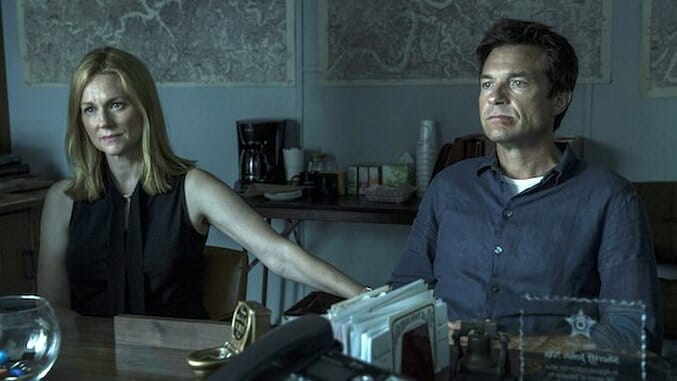This review contains minor spoilers.
Titles can be funny.
When you first hear that Netflix’s new series is called Ozark and stars Jason Bateman, you might think it features the Arrested Development stalwart in a quirky, fish-out-of-water comedy.
Instead, the dark drama goes down a path we’ve seen perhaps one too many times before, on series such as Breaking Bad, Weeds and, most recently, the TNT’s freshman drama, Claws. It’s the good person who gets caught up in doing bad things (making meth, selling marijuana, laundering money) for a seemingly compelling reason (dying of cancer, sudden loss of spouse, wanting to provide a better life for her brother).
What makes Ozark different is that the series begins where many may have ended, making the pilot seem like it could be a series finale of another show: In an alternate TV universe, Ozark might have been the spin-off that didn’t quite live up to the original. Marty Byrde (Bateman, who also serves an executive producer on the series and directs several episodes) is a Chicago financial advisor who has been laundering money for years for drug lord Camino Del Rio (Esai Morales). The only problem is, Marty’s partner, Bruce (Josh Randall), has been skimming to the tune of a missing $8 million. Marty, his wife, Wendy (the always luminous Laura Linney), and their two children, Charlotte (Sofia Hublitz) and Jonah (Skylar Gaertner), head to the Ozarks for Marty to set up the money laundering business and get Camino his money back. Marty convinces Camino that the feds won’t be looking as carefully in coastal Missouri. “More shoreline literally than the entire coast of California and every summer, five million cash-rich tourists descend on the place,” Bruce promises Marty and Marty in turn promises Camino.
Marty drives a Honda Odyssey with those annoying family stickers on the window and he exasperatedly admonishes his children, “I’d love not to turn the room upside down to find the clicker.” Marty is an everyman, and the show reminds us of this every chance it gets. Wendy is saddled with the housewife-who-doesn’t-know-what-to-do-with-her-time-now-that-the-kids-are-growing-up angle. One of her major story arcs in the early episodes is her quest for organic pistachio ice cream. I’m not making that up.
Because Marty’s story is well traveled TV fodder, the series must come up with fresh spins on an old tale. So the Byrde family’s new home in the Ozarks comes with the fact that the previous owner, Buddy Dyker (Harris Yulin), gets to live there until he dies, which is anywhere from a year to 18 months depending on how his failing heart holds up. Oh, and did I mention that Buddy likes to walk around nude all the time?
Marty gets caught up with the Langmore family and the clan’s de facto matriarch, Ruth (Julia Garner, so wonderful on The Americans and equally adept here), a 19-year-old grifter who is much smarter than she lets on. Marty convinces local hotel owner Rachel Garrison (Jordana Spiro) that he wants to invest in her Blue Cat Lodge and turn it into a profitable (and cash-based) operation. There’s also FBI agent Roy Petty (Jason Butler Harner), who is saddled with issues. And a preacher (Michael Mosley) who proselytizes from a boat. The show so wants to stand out, but it contains one disparate story line too many and they distract from instead of feed the main story. Or, in Ruth’s case, become the show you’d rather be watching.
Ozark, from executive producer and show runner Chris Mundy (Low Winter Sun), also employs two TV tropes I’m all set with. One is action taking place in strip clubs while scantily clad women gyrate in the background of a scene. I’ve complained about this before. I don’t care if criminal activity really does take place in strip clubs. It’s just so degrading and I don’t need to see it on my TV anymore. The other is the Mexican drug lord. Morales is very good and very scary. But his calm demeanor, his penchant for talking in riddles and his readiness to explode in violence at any moment are clichés we’ve seen many times before. (And, in the current political climate, it seems particularly dangerous to be feeding this particular stereotype.)
Four episodes in, and the series still hasn’t told us why Marty got into the money laundering game in the first place. Was it just greed and the quest for material things? Was it to infuse excitement into his “tragically subdued” life? Do we even care?
The series also takes leaps in logic that would make the narrative collapse if you thought about it too much. Marty dissolves his Chicago firm to move to the Ozarks. What became of all the people who invested with his firm? Especially that nice couple who just wanted to put a pool in the backyard and gave Marty $5,000 at the start of the show?
Vultures routinely circle Marty’s new home (like I said, the metaphors are overt), and now that Netflix has demonstrated it will cancel shows, I’m wondering how long it will be until the vultures come for Ozark.
Ozark is now streaming on Netflix.
Amy Amatangelo, the TV Gal®, is a Boston-based freelance writer, a member of the Television Critics Association and the Assistant TV Editor for Paste
. She wasn’t allowed to watch much TV as a child and now her parents have to live with this as her career. You can follow her on Twitter (@AmyTVGal) or her blog .